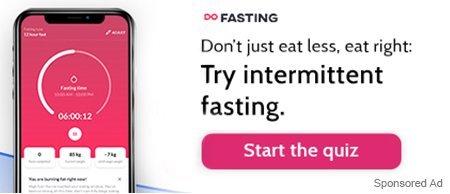What is Intermittent Fasting | What Causes Bloating | Tips to Avoid Bloating | Ways to Get Rid of Bloating
Feeling bloated? Lose that bloating with intermittent fasting! Intermittent fasting helps you lose weight, reduce fatigue, and stay energized. But did you know it also improves digestion and relieves bloating?
Bloating is common among adults, especially those suffering from irritable bowel syndrome (IBS). A new study by Cedars-Sinai investigators revealed that 1 in 7 Americans endure bloating at least once a week.
Intermittent fasting, with its periods of fasting and eating, allows the gastrointestinal system to reduce inflammation, which is otherwise not possible with constant eating.
This article takes you through the causes of bloating, how to prevent bloating, and tips to get rid of bloating.

Is it Normal to Become Bloated During Intermittent Fasting (IF)?
According to the Mayo Clinic, it is normal to experience bloating during IF. In most cases, your body naturally resolves the bloating without any issues.
Also, your bloating should ease off within 24 hours if it’s something you ate. However, if you have been bloated for days or weeks, it indicates some underlying health issue and may require medical attention. Although it’s rare, bloating can also signify a serious medical condition.
If you have ongoing bloating along with the following symptoms, seek medical advice immediately:
- Fever
- Vomiting
- Diarrhea
- Appetite changes
- Severe abdominal pain
- Bright red blood in the stool
- Black or dark maroon stools

What Causes Bloating?
What is bloating? Bloating is a harmless condition where your GI tract fills with excess intestinal gas. It presents as tightness, fullness, or pressure in your stomach.
Why do you experience bloating? It can be due to several reasons, from low-fiber foods to lactose intolerance, overeating, and excessive consumption of sugary drinks such as juices and sodas.
It is also possible to feel bloated if you are not used to eating large quantities of food in one go. Other factors that cause intermittent fasting bloat include fatty and hard-to-digest foods, an extended fasting period, dehydration, etc.
Bloating is greatly influenced by how and what you eat. For example, a diet rich in salty, low-fiber foods will make you feel bloated.
It is common to experience bloating during intermittent fasting, especially during the initial days. The initial bloating is the body’s reaction to adjusting to the food restriction. As you progress with your fast, your body adapts to its new timing, and the bloating resolves itself.
Tips to Avoid Bloating

Bloating is generally harmless as long as it resolves on its own. However, it can be uncomfortable enough for people to misunderstand it as hunger pangs.
While you cannot cure bloating, intermittent fasting can help reduce bloating to a large extent. However, if it continues, you may have to adjust your fasting window and watch what you consume in your eating window.
For example, the first meal of the eating window should be nutritious with plenty of lean protein. And a couple of hours later, you can introduce carbohydrates slowly.
Ironically, fasting is one of the foolproof ways to relieve bloating. Recent research states that intermittent fasting improved the symptoms of IBS, including bloating, diarrhea, and abdominal pain and discomfort, to name a few.
So here are a few ways in which you can avoid being bloated.
1. Spread out Your Meals
Eating a wide variety of food in a short window of time can overwhelm your digestive system. Instead, spread it out over a few hours and give your digestive system time to digest every meal.
Start with your protein and fat as your first meal, and then wait a couple of hours for your vegetables. This gives your digestive system enough time to produce the necessary enzymes.
All things said, ensure that you have protein as your last meal in your eating window.
2. Don’t Overindulge

It is tempting to overeat and indulge yourself when you break your fast. The ideal first meal in the eating window makes you feel full but not stuffed. While stuffing yourself is tempting after fasting for hours, it can also lead to bloating.
However, eating too little can also cause problems like cravings as your body lacks nutrients. Finding a subtle balance between feeling satiated and not overstuffed is the key.
3. Avoid Foods You’re Allergic to
Watch out for foods that you are sensitive to or allergic to, especially dairy foods (presence of lactose or casein). Vegetables like broccoli, kale, cabbage, cauliflower, and beans are some of the other vegetables that may cause bloating. Try removing them from your diet and see if there’s any improvement.
Also, watch out for grains, sugars, and processed foods. These may contain sugars that most people do not tolerate well. If undigested, they stay in the gut, fermenting and producing gas.
4. Reduce Fat
While intermittent fasting doesn’t restrict food intake, you should eliminate fatty foods. Too much fat can lead to digestion issues, unnecessary strain on the gallbladder, and, not to mention, bloating.
Instead, indulge in nutrient-rich high-calorie foods such as fatty fish, eggs, cheese, milk, paneer, seeds, nuts, etc.
5. Increase Fiber Intake
Increasing the fiber intake can soften the stool, reducing constipation and bloating. In addition, a fiber-rich diet can help food move along the GI tract efficiently, preventing abdominal gases from forming and accumulating in the intestines. The recommended fiber intake is 25 g for women and 38 g for men.
However, consuming too much fiber or increasing fiber intake too quickly can have negative effects on the body, specifically abdominal distress and bloating. The trick is to start slowly and let your body get used to the increased fiber.
6. Drink Plenty of Water

One of the side effects people face with intermittent fasting is dehydration. With reduced food intake, people often forget or may not drink enough drinking water, which can worsen constipation, especially in the initial stages of fasting.
Ensure you drink enough water throughout the day, even during the fasting window. If you don’t, you can become dehydrated, which is also a cause of bloating.
Ways to Get Rid of Bloating
The best way to end bloating is to identify the cause. Unfortunately, bloating often happens right after a meal; while it usually resolves, you may need some help to speed up the process.
Here are a few tried and tested home remedies to eliminate bloating.
- Go for a short walk: Make it a point to walk around the block to get your bowels moving, especially if you feel constipated.
- Use essential oils: While essential oils can be ambiguous, recent studies prove that ginger oil, chamomile oil, peppermint oil, and cumin oil help cure bloating.
- Take a warm bath: A long warm bath can work wonders for your stress levels, allowing your GI tract to function efficiently and reduce bloating.
- Replace soda with water: Fizzy sodas can create a gas build-up in the stomach. In addition, the acidic nature of the drink can cause the body to produce more gas as a defense mechanism. Instead, replace it with a fresh lemon-ginger tea to soothe inflammation and increase digestion.
- Add probiotics to your diet: Take a probiotic supplement every day. Probiotics contain good bacteria, which aid digestion and prevent gas formation.
- Reduce salt intake: Excess sodium in the body retains water, making you feel bloated. According to WHO recommendations, adults can consume less than 5 g of salt daily.
- Add regular exercise to your routine: Regular exercise can help with bowel movements. It also helps expel excess sodium from the body.
Wrapping Up
I personally get a reduction in bloating when I do intermittent fasting in my experience. The rest my digestive system gets during fasting really helps lower my bloated gut, and look more flat over time, usually the longer I fast. Also try to avoid processed foods, carbs, beans, etc. if you are trying to avoid getting bloated. You can also take Apple Cider Vinegar or activated charcoal to help naturally reduce gas and bloating.
Can you lose that bloating with intermittent fasting? It can help absolutely! Bloating is a harmless condition caused by the accumulation of excess gasses in your abdomen. Bloating during intermittent fasting is harmless and can resolve itself over a few hours.
There can be many reasons why you are feeling bloated, and as such, the solutions also vary. Some simple solutions include drinking enough water, having enough food without overeating, and spreading your meals over a few hours. Surprisingly, bloating can also be caused by your food, especially fatty foods and foods to which you are allergic.
The key to not feeling bloated is to have a nutritious, balanced diet that comprises lean meat, whole grains, fruits, and vegetables.
I recommend starting here to learn more about these types of fasting which are the MOST popular, starting with 16/8 Fasting, click on these guides below to learn more:
16/8 Fasting Guide, 14/10 Fasting Guide, 18/6 Fasting Guide, One Meal a Day Guide.
Also need help fasting? Check out these Top 6 Fasting Mobile Apps we recommend to help you on your journey.











